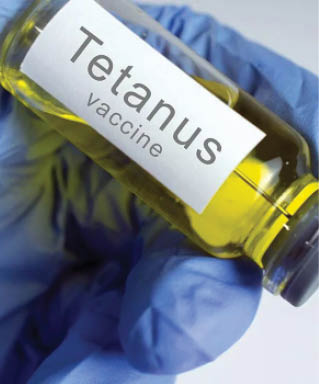Tetanus: why individuals should take precaution
On his daily hustle in Lagos, Harron Adefarasi got a deep leg cut when his vehicle had an accident. He went straight to the hospital for a tetanus shot. Unknown to him, the vaccine was no longer potent—it had been poorly stored or had expired. Tetanus infection set in and got worse. It spread from […]

Tetanus
On his daily hustle in Lagos, Harron Adefarasi got a deep leg cut when his vehicle had an accident. He went straight to the hospital for a tetanus shot.
Unknown to him, the vaccine was no longer potent—it had been poorly stored or had expired.
Tetanus infection set in and got worse. It spread from his leg to his brain. He went unconscious for three days. Then he died.
Tetanus is also known as lockjaw, is caused by a bacterium called Clostridium tetani. It is a fatal bacterial infection that affects the nerves, causes painful muscle contractions in the jaw and neck, interferes with the ability to breathe and can lead to death.
The spores of tetanus bacteria are everywhere and they develop when they enter the body.
Throughout the world, tetanus has a prevalence of 0.5 to 1 million cases, according to medscape.com while in Nigeria, there are fewer than 500 cases per year.
The College of Medicine, University of Ibadan, noted that touching a contaminated surface can cause tetanus.
Experts insist that once an individual has direct contact with a sharp object, it is advisable to quickly become vaccinated against tetanus immediately.
Tetanus otherwise known as TT injection is being given at no cost in all general hospitals and primary healthcare facilities in Lagos for free.
Best time for a TT vaccine
The best time for a tetanus vaccine is immediately after having contact with a contaminated surface or sharp object. If it cannot be possible immediately, then the injection should be taken three days after.
Complication
Some of the complications of tetanus infection are; breathing problems, blockage of a lung artery, pneumonia, broken bones and death.
Prevention
Tetanus is preventable. Wound care and vaccination are the available options to prevent tetanus infection.
Children are most prone to the infection as they tend to be carefree and play sometimes without footwear, thereby endangering them to a cut which can lead to tetanus infection. However, tetanus vaccine, when given to a child as part of the routine immunization prevents the complications. Experts recommend a vaccine when the child is less than six years, then a booster shot for children at age 11 or 12, then another booster shot once every 10 years for adults. Also, pregnant women are enjoined to prevent tetanus infection by taking TT injection. Reason is, an umbilical cord can become infected when a mother is not fully vaccinated.
Femi Balogun, a close ally of Mr Haroon noted, “Many people have had nail cuts and other sharp objects must have been stepped on by many others and they had no tetanus. It is important that, as individuals, we should be careful with our health and take no chances. Whenever any object pricks us, we should quickly attend to it before it becomes what cannot be handled. Medical experts have said antibiotics should be taken immediately to prevent tetanus, however, that should not stop us from taking the injection as at when due.”
